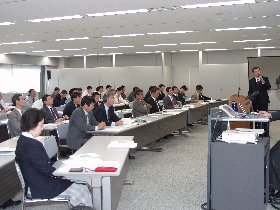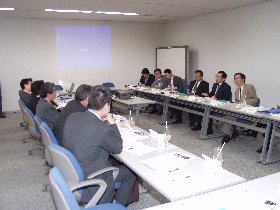|
|
 |
On March 20th, 2002, the 34th Safety Caravan was held at the YokohamaWorld Operations Center of JGC Corporation, which is located in Nishi-ku, Yokohama-shi, Kanagawa Prefecture.
|
Safety Presentation |
About 50 staff of the JGC Corporation and staff of cooperating companies attended the safety presentation. The chief researcher of JGC's Research and Development Center in Oarai, opened the safety presentation with the following greetings: "JGC Corporation joined NSnet in December 2000 because the company is engaged in designing and construction of nuclear facilities. In addition, the company's Research and Development Center in Oarai uses radioisotopes, and has signed the Oarai Safety Agreement as well as the Tokai NOAH Agreement. The Research and Development center also conducts various research projects on fossil fuels, and we consider safety issues in many different contexts on a daily basis. However, I believe that safety engineering for nuclear facilities can be applied to other chemical facilities, and I would like to be able to make the best of what I learn from today's lecture."
|

Safety Presentation
|
Following introductions of NSnet activities, a lecturer formerly of Tokyo Electric Power Co., Inc. gave a speech entitled "What are the secrets of safety - lessons to be learned from facilities free of accidents". |
An introduction was given regarding the results of their study on the factors behind chemical plants which had been awarded for being free of accidents, as well as the "secrets of safety" which were drawn upon the results. During the lecture, as an example of an organization free of accidents, the speaker presented a case study about a chemical plant owned by company "A" which had experienced consecutive accidents, and introduced their efforts after these accidents.
The "secrets of safety" discovered from the study are the following four points:
1 There is no one specific measure to maintain safety.
2 The stance of top executives to act on their own and the activities of employees to do anything they can should be steadfastly pursued.
3 A mechanism in order for activities to be pursued should be established.
4 Every employee must earnestly address safety.
|
| Discussion session |

Discussion session
|
At the discussion session, NSnet introduced positive peer review examples, as well as its exclusive website for members, and others.
Additionally, JGC Corporation introduced some of their policies of top priority which included "Safety and Hygiene Standards" and "Operational Standards for Safety and Hygiene".
Among the main opinions to come out of the subsequent discussion included the following:
- Even when we work according to instruction manuals for quality control, even experienced engineers forget something, or leave without going over the checklist even though they intended to. When following a manual, there are always such mistakes. I wonder if anyone could give me a solution to this kind of problem.
- A checklist must suit the skills and abilities of the person who uses it, but this is challenging. No matter how much you use a checklist, a bad checklist is no good. I would like to request plant makers to discuss this issue as well.
|
|
|







